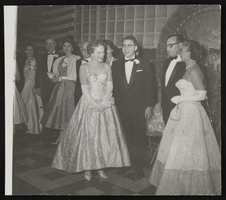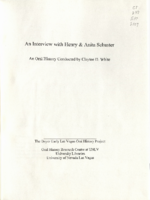Search the Special Collections and Archives Portal
Search Results

Transcript of interview with Dr. Robert Aalberts by Claytee D. White, November 16, 2006
Date
Archival Collection
Description
Text

Ellen Barre Spiegel interview, December 4, 2017: transcript
Date
Archival Collection
Description
Ellen Barre Spiegel grew up in Jericho NY, a predominantly Jewish town in Long Island. Her ancestors had migrated to the United Sates prior to the outbreak of World War II. And for much of life her exposure to cultural diversity was limited. Ellen was born in 1962. She attended Cornell University, located in upstate New York, and graduated in 1984. Though the student population was 30% Jewish, the university expanded her knowledge of the world: her Protestant roommate explained that she had never met a Jew and Ellen replied, I have never met a WASP. Her college studies centered on consumer economics and she was a public policy major. Ellen was an early adopter of technology and her career path included positions at American Express, Prodigy (a joint venture of IBM and Sears), the Weather Channel, and Manufacturers Hanover Trust. Each company used her increasing experience with using technologies to improve connections with consumers. Ellen describes her Jewish identity as conservative and is a member of Midbar Kodesh Temple in Henderson. She talks about her bat mitzvah and her move back to New York to recite the mourner’s Kaddish for the year following the passing of her father. Later, she moved to Santa Monica, where she met Bill, her husband, using a new dating site called Luvitt AOL. After marriage, the couple saw financial advantages to living in Las Vegas and relocated their business and home to the valley in 2001. Soon Ellen noted that there was no active Democratic Club in Henderson and it became her mission to reignite the club. This launched a long list of political and civic accomplishments for Ellen. She has been an assemblyperson in the Nevada legislature (2008, 2013-2017). Her list of accomplishments and affiliations are on pages 46-47.
Text

Photographs of Governor's Ball, (Nev.), 1959-1967
Date
Archival Collection
Description
Image

Transcript of interview with Henry and Anita Schuster by Claytee White, March-April 2011
Date
Archival Collection
Description
In this oral history, the long married couple Henry and Anita Schuster recall the history of the 1930s and how they eventually met and created a life together. Their childhoods were distinctively different, but charter a future where they would inevitably meet. Born in Germany in 1926, Henry recalls the dawn of Hitler and the Nazism. His mother would arrange for his evacuation to France, where he would not know her fate or that of his two sisters for a number of years. Along with hundreds of other displaced children, he escaped to America and lived with relatives in Louisiana where he finished his schooling and joined the US Army. Anita on the other hand grew up with her family in New York. They share the story of meeting when she was 16, falling in love and marrying in 1948. They had four children and moved several times before settling in California. They retired to Las Vegas in 1993. Henry's recollections include childhood memories of the Holocaust and its affect on his family, including the loss of his mother and one of his sisters. Finding his surviving sister Bertel (Betty Kale) after the war is a heartwarming tale of survival. The Schusters are part of the approximately 300 members of the Holocaust Survivor Group that has settled in southern Nevada and Henry was President Emeritus of the group. He published his memoir, Abraham's Son-the Making of an American, in 2010.
Text

Transcript of interview with Steven Eisen by Barbara Tabach, September 14, 2016
Date
Archival Collection
Description
Steven Eisen (1966 - ) is the oldest son of Barry and Beverly Eisen, who were part of the migration of Jews from St. Louis to Las Vegas in the 1960s. He is married to Stacy Fisher and the older brother to Andrew and Robert Eisen. They are members of an early group of born-and-raised Las Vegans. Growing up Jewish, he became a bar mitzvah, belonged to B?nai B?rith Youth Organization. In this oral history interview, Steve recalls enjoyable stories of growing up in Las Vegas and humorous anecdotes of mistaken identity since the three brothers bear such strong physical resemblances. Today he finds himself enjoying his career as CEO of the Children?s Heart Center since 2001 and talks about the success and reputation of the pediatric medical group. It was his first job as a fourteen year old helping Theodore Manos and Michael Cherry during the MGM fire litigations where he learned about the legal world and being organized as a path to success in whatever he might pursue. Steve graduated from University of Missouri, attended law school at Washington University in St. Louis, and received his business degree from UNLV. Throughout the interview, he recalls the steady and strong involvement of his parents in their sons? educations. He also describes their active connection with the Jewish community and organizations. Steve?s wife Stacy is a professor in physical therapy at Touro University.
Text
Bananto, Ronald, 1930-2002
Ronald Bananto was born February 13, 1930 in Coal Run, Pittsburgh, Pennsylvania. Bonanto moved to Pioche, Nevada in 1949. A year later, and after a short period in San Francisco, California, Bonanto relocated to Las Vegas, Nevada in 1950. He lived in Nevada for 29 years and worked for the Las Vegas Metropolitan Police Department for 23 years. Bananto married Pamela Schofield Bananto.
Person
Esther Toporek Finder oral history interview
Identifier
Abstract
Oral history interview with Esther Toporek Finder conducted by Barbara Tabach on June 08, 2016 and June 28, 2016 for the Southern Nevada Jewish Heritage Project. In this interview, Finder discusses her childhood and her passion for the Holocaust survivor community. She shares her experiences interviewing survivors and their descendants over the years. In addition, she reflects on her long reach within the survivor community and highlights the traveling, teaching, and community service opportunities she has had.
Archival Collection
Joan and Leslie Dunn oral history interview
Identifier
Abstract
Oral history interview with Joan and Leslie Dunn conducted by Barbara Tabach on June 20, 2016 and May 30, 2017 for the Southern Nevada Jewish Heritage Project. Leslie discusses working for the United States Public Health Service at the Nevada Test Site for twenty years and launching a development business after retirement. Joan discusses setting aside her career to begin a family and later becoming a business partner with her husband.
Archival Collection
Mirta G. Feinberg oral history interview
Identifier
Abstract
Oral history interview with Mirta G. Feinberg conducted by Jeffrey Smith on April 22, 2006 for the Public School Principalship Oral History Project. In this interview, Feinberg reflects upon her 38-year career in education, with the bulk of her career taking place in California. She describes the process by which she became a principal, and her experiences working with bilingual education. She discusses challenges that she faced as a principal such as school safety, and describes her working relationship as a principal with assistant principals.
Archival Collection
Tom Maveal oral history interview
Identifier
Abstract
Oral history interview with Tom Maveal conducted by Cheryl Peters on April 13, 2004 for the Public School Principalship Oral History Project. In this interview, Maveal reflects upon his nearly 30-year career as a teacher and administrator with Nevada’s Clark County School District from the 1970s to the 2000s. He discusses his experiences working as an administrator with Title I, and compares this with his experience as a principal. He describes his regular job responsibilities and challenges, and discusses bilingual education programs.
Archival Collection
